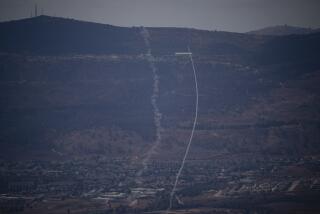Top British Cabinet Minister Steps Down in Protest
- Share via
LONDON — As British Prime Minister Tony Blair prepared Monday to lead his restive and divided nation to war, a top Cabinet minister resigned in protest and another said she also might step down.
Robin Cook, leader of the House of Commons and a former foreign secretary under Blair, quit after Britain, the United States and Spain decided to abandon a proposed U.N. resolution authorizing use of force against Iraq. Cook told Blair just before an emergency Cabinet meeting that he could not support military action without U.N. backing, which London had urgently sought because of strong public opposition to war.
“It is not your fault that those attempts have failed,” Cook told Blair in his resignation letter. “However, the evident importance that we attached to a second resolution makes it all the more difficult now to proceed without one and without agreement in any other international forum. As I cannot give my support to military action in these circumstances, I write with regret to resign.”
Cook’s announcement bruised a government girding for a major debate on war plans today in Parliament, where dissidents in Blair’s left-leaning Labor Party could mount their biggest rebellion yet. And another Cabinet member, International Development Secretary Clare Short, might quit today. Short, whose departure has been anticipated since she called Blair’s Iraq policy “reckless” last week, told journalists Monday that she would consider her decision overnight.
The upheaval was the worst Blair has experienced since becoming prime minister in 1997, but it was neither unexpected nor fatal. Even if a record number of Labor legislators vote today against military action, Blair will most likely prevail because the Conservative opposition supports him on Iraq.
Nonetheless, the collapse of diplomacy makes it imperative for Blair’s political future that any war be short, successful and relatively clean, analysts said.
“He will win his vote,” said George Jones, a political science professor at the London School of Economics. “How many will vote against him is hard to say, but it will be damaging for Blair. He will get the vote ... also because of Conservative support. After that, much will depend on what happens with the war. If it goes badly, I don’t think he will want to stay on as party leader.”
Last month, about a third of Labor lawmakers voted against the government on the question of whether war was justified.
The Iraq crisis has hurt Blair on two domestic fronts. His relationship with his party -- strained over the years by his centrist leanings -- has been fundamentally weakened. And his esteem among the public has fallen as Britons have turned out with great force, whether in television debates or street protests, to chastise his unwavering alliance with President Bush.
So even though Labor is unlikely to oust him and no real political challengers have arisen, Blair might not remain in office long if an invasion of Iraq goes drastically awry, said Adrian Smith, a modern history professor at Southampton University.
“It’s only in exceptional circumstances that leaders of the Labor party depart,” Smith said. “It depends on how long the war goes on. Of course, if something cataclysmic happens, such as an American bomb falling on civilians and causing maximum negative publicity, there may be a case for his leaving.”
British leaders had seen a war without international consensus as a worst-case scenario. But Blair’s all-out efforts to reach a compromise between bitterly divided factions led by the United States and France have not been completely in vain. The majority of Britons may disagree with Blair, whose weary face shows the toll of recent weeks, but they tend to respect his earnest determination, analysts said.
“His sincerity and belief in his place in history is what often comes across and wins him votes of sympathy, if not support, from some press and public,” Smith said.
A new poll seemed to confirm that analysis Monday. The ICM survey showed that disapproval of war against Iraq had fallen by 8 percentage points to 44%, while support rose by 9 points to 38%. Blair’s personal approval rating rose 9 points after taking a sustained beating of late.
Blair has also been shielded by a strategy his government pressed with gusto Monday: Blame France. Deputy Prime Minister John Prescott took up the offensive, reiterating the Anglo-American assertion that the French threat to cast a U.N. Security Council veto was unreasonable and had doomed hopes of averting conflict.
“We deeply regret that the French intransigence and the Iraqi noncompliance have left us with no option but to bring discussions on our draft resolution to an end,” Prescott declared. Had the United Nations stayed united after passing Resolution 1441 last fall mandating Iraqi disarmament, Prescott said, “we could have disarmed Saddam without a shot being fired.”
In his resignation speech Monday night in Parliament, however, Cook pointed an accusatory finger at Bush rather than at France. Cook said he suspected that Britain would not be about to send soldiers into combat if Al Gore had been elected president in 2000.
More to Read
Sign up for Essential California
The most important California stories and recommendations in your inbox every morning.
You may occasionally receive promotional content from the Los Angeles Times.













